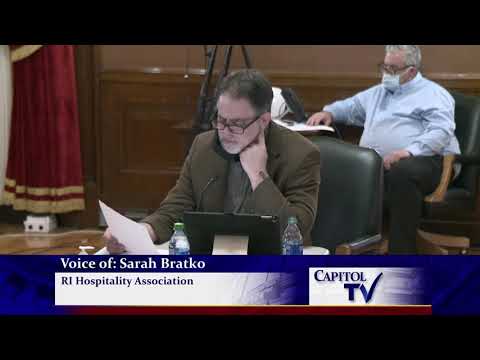Catching up with COYOTE RI and the legislation important to sex workers
“There’s no one more opposed to sex traffickers than sex workers,” says COYOTE RI’s executive director Bella Robinson.
February 23, 2021, 2:02 pm
By Steve Ahlquist
Bella Robinson, who leads COYOTE RI, has been advocating for the rights of sex workers and for the decriminalization of sex works for over a decade in Rhode Island. (You can read a piece Robinson recently co-authored with Katherine Chin on Open Democracy here.) I contacted Robinson near the start of the 2021 Rhode Island General Assembly legislative session to find out what bills were priorities for her organization this year. The first bill we discussed was Senator Samuel Bell‘s S0249, which would make it a crime for police officers to engage in sex with persons in their custody.
Robinson was able to relate several stories of police officers violating the rights of women in their custody. Surprisingly, there is no law preventing police officers for engaging in sex while on duty.
The next bill on COYOTE’s radar this legislative session has already had its hearing in the House. H5270 from Reresentative Grace Diaz, the Human Trafficking Reporting and Prevention Act, requires hotel owners “to educate their employees about identifying, reporting and preventing human trafficking, on their premises.”
Advocates for sex workers often struggle to keep up with the barrage of legislation that targets them. Robinson didn’t see the bill until she was alerted by the ACLU, the night before the hearing. She managed to send in written testimony, but did not receive a call from the House Corporatations Committee clerk to testify by phone.
Nevertheless, Robinson thought the hearing was very interesting. “I can tell that at least two of the Reps read my testimony because they asked, ‘How do you know if this is sex trafficking or sex work…?'”
“I have concerns that we’re placing these requirements on the hotel owners and their staff to be able to be able to make distinctions and to determine whether or not trafficking is occurring,” said Representative Michael Chippendale during the hearing, “and I’m not sure how we can expect folks to determine the difference between prostitution and sex trafficking.” Representative Brandon Potter later inquired along the same lines.
Sarah Bratco, lobbyist for the Rhode Island Hospitality Association (RIHA), noted that sex work and sex trafficking will often look the same, and that both are illegal. Representative Diaz’s answered that the police would be the ones to define the situation, once they were alerted and investigated. Of course, some people identified as potential sex traffickers may not be engaged anything remotely illegal. Imagine a father traveling with his different race daughter.
The conflation of sex work and sex trafficking is “the best federally funded misinformation campaign paid for by your tax dollars,” said Robinson and the weight of social science seems to be shifting in support of this view. (See: Decriminalise sex work to prevent trafficking and abuse)
Anti-trafficking campaigns are extremely profitable for philanthropic groups that get huge donations from large corporations that may routinely underpay workers in distant companies, but can look good with multi-million dollar donations to charities that pay their executives large salaries to “save children” form sex trafficking. (See: How has philanthrocapitalism helped or hurt the anti-trafficking movement?)
Robinson and other researchers into sex work and sex trafficking doubt the numbers being used to justify the efforts of anti-trafficking groups, comparing their claims to the discredited pedophilia ring claims of Qanon and PizzaGate. Also, notes Robinson, “there’s no one more opposed to sex traffickers than sex workers.”
H5467, introduced by Representative Anastasia Williams, could be very helpful in protecting the lives of sex workers, and allowing sex workers to feel free to report crimes they witness, like sex trafficking, to the police. The act would “grant immunity to people engaged in commercial sexual activity if they report to law enforcement that they are victims of or witnesses to a crime. This act would ensure that they feel safe in coming forward to report crimes and are able to report exploitation or violence committed against others.”
The bill seemed similar to the Good Samaritan law in Rhode Island, which allows a person using illegal substances to call for medical help if they witness someone overdosing. Previous to the passage of the Good Samaritan law, calling for help for an overdosing friend could land you in jail for illicit substance use.
But Representative Williams’ bill goes further, said Robinson. “Most violence happens to sex workers because they know that thy can’t call the police.”. The police for the most part are uninterested in crimes against sex workers, who have no real way to enforce their rights or advocate for justice. An ability to report crimes against themselves or others without fear of prosecution would go a long way towards protecting the lives and the rights of sex workers.
H5250, also from Representative Williams, creates a House Commission to study “the health and safety impact of optimizing health and safety laws affecting marginalized individuals.” The bill specifically mentions Black and transgender people, and refers to studies about the effect criminalizing sex work has had on the health and safety of sex workers. If passed, COYOTE RI and Amnesty International will have seats on the commission.
H5250 will be heard at 7pm on February 25 in the House Committee on Health and Human Services.
The last piece of legislation Robinson and Uprise RI discussed was not in the General Assembly, but over in the Providence City Council, where Councilmember David Salvatore introduced an ordinance that more strictly codifies the licensing of strip clubs, and contains a paragraph that would remove any private/isolated areas, so called “VIP rooms,” in strip clubs.
That hearing took place in the Providence City Council Ordinance Committee on February 10. (See video below) Robinson pointed out that right now, the clubs are closed because of the pandemic, but also that the dancers at these clubs are not employees (they are technically private contractors), and therefore were unable to collect unemployment during the pandemic.
Salvatore said that in talking to his constituents, he’s concerned about violence taking place against people in the sexual entertainment industry. “A lot of times women are pressured,” said Salvatore. “They’re pressured to perform sexual acts by club owners and managers and staff without the legal protections that they should have…”
That said, Salvatore is very interested in hearing from workers in the strip club industry, to get a more accurate picture of their working conditions.
















